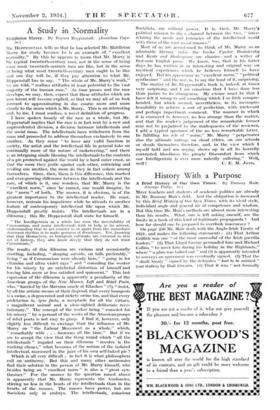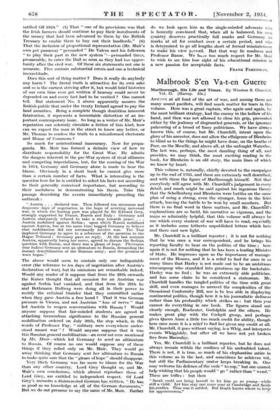History With a Purpose
A Brief History of Our Own Times. By Ramsay Muir. (George Philip. 5s.) A Brief History of Our Own Times. By Ramsay Muir. (George Philip. 5s.) MOST teachers and students of academic politics are already in Mr. Ramsay Muir's debt. And the obligation is increased by this Brief History of Our Own Times, with its vivid style, individual angle and general air of competence and wisdom. But this time Mr. Muir's methods arc almost more interesting than his results. What, one is left asking oneself, are the limits in a book of this kind of legitimate propaganda ? And how far should one be prepared to overlook inaccuracy ?
On page 250 Mr. Muir deals with the Anglo-Irish Treaty of 1921, and makes the following statements : (1) That Arthur Griffith was one " of the most successful of the Irish guerilla leaders." (2) That Lloyd George persuaded him and Michael Collins " to meet him during his holiday in the Highlands," where " a plan was talked out " and (it is apparently intended to convey) an agreement was eventually signed. (3) That the " draft treaty " signed by the delegates " had to be ratified " (our italics) by Dail Eireann. (4) That it was " not formally ratified till 1924." (5) That " one of its provisions was that the- Irish farmers should continue to pay their instalments of- the money that had been advanced to them by the British Treasury to enable them to buy out their landlords." (8) That the inclusion of proportional representation (Mr. Muir's own pet panacea) " persuaded " De Valera and his followers " to play their part in the new system "—persuaded them, presumably, to enter the Dail as soon as they had time oppor- tunity after the civil war. Of these six statements not one is accurate. Five contain substantial errors and one a technical inexactitude.
Does this sort of thing matter ? Does it really do anybody any harm ? The literal truth is attractive for its own sake and so is the earnest striving after it, but would brief histories of our own time ever get written if hearsay could never be depended on and every fact had to be verified ? One cannot tell. But statement No. 5 above apparently assures the British public that under the treaty Ireland agreed to pay the land annuities. Being a complete though doubtless innocent fabrication, it represents a lamentable distortion of an im- portant contemporary issue. So long as a writer of Mr. Muir's reputation can solemnly circulate a fiction of this kind, how can we expect the man in the street to know any better, or Mr. Thomas to confess the truth to a misinformed electorate and House of Commons ?
So much for unintentional inaccuracy. Now for propa- ganda. Mr. Muir has formed a definite view of how to distribute responsibility for the Great War. He admits the dangers inherent in the pre-War system of rival alliances and competing iniperialisms, but, for the coming of the War in 1914, Germany and Germany alone is made to bear the blame. Obviously in a short book he cannot give more than a certain number of facts. What is interesting is the question how far he is entitled to select his facts not according to their generally conceived importance, but according' to their usefulness in demonstrating his thesis. Take this passage describing the events immediately preceding the outbreak : " Austria . . . declared war. Then followed ten strenuous and desperate days of negotiation in the hope of averting universal war, in which the leading part was played by Sir Edward Grey, strongly supported by France, Russia and Italy : Germany and Austria obstinately refused to take a step towards peace. . . . Austria mobilized against Serbia ; upon which Russia mobilized against Austria, but at the 'same time begged Germany to believe that mobilization did i hot necessarily involve war. The Tsar implored Germany to agree to a reference of the question to the Hague Tribunal ; Germany gave no reply. At the last moment Austria, apparently losing her nerve, agreed to discuss the Serbian question with Russia, and there was a gleam of hope. ' Thereupon (our italics) Germany sent an ultimatum to Russia, demanding the instant demobilization of the Russian army; and the greatest of wars began."
The above would seem to contain only one indisputable error (the reference to ten days of negotiation after Austria's declaration of war), but its omissions are remarkable indeed. Would any reader of it suppose that from the 28th onwards the Kaiser thought that all occasion for an Austrian war against Serbia had vanished, and that from the 29th he and Bethmann Hollweg were doing all in their power to rectify the cri.'ainal blunder that they committed earlier when they gave Austria a free hand ? That it was German pressure in Vienna, and not Austrian " loss of nerve " that led Austria to reopen conversations with Russia ? Would anyone suppose that fair-minded students are agreed in attaching tremendous significance to the- Russian general mobilization ordered on July 30th, the step which, in the words of Professor Fay, " military men everywhere under- stood meant war " ? Would anyone suppose that it was this Russian general mobilization—an event not even mentioned by Mr. Muir—which led Germany to send an ultimatum to ;Russia. Of course no one would suppose any of these things if they relied only on Mr. Muir. They would go away thinking that Germany sent her ultimatum to Russia to make quite sure that the "gleam of hope" should disappear. Very likely Germany was far more to blame for the War than any other country. Lord Grey thought so, and Mr. Muir's own conclusions, which almost reproduce those of Loid _Grey, are entitled to independent respect. Of Lord Grey's memoirs a disinterested German has written, " lie has as good as no kmiwledge- at all of the German documents."' But we do not presume to say the same of Mr. Muir. Rather do we look upon him as the single-minded advocate who is honestly convinced that, when all. is balanced, his own country „deserves practically full marks and Germany no marks'sat all for conduct over a certain period, and who is determined to go all lengths short of formal misstatement to make his view prevail. But that way lie madness and Professor Banse. We have too much respect for Mr. Muir to wish to see him lose sight of his educational mission in a new passion for acceptable facts.
FRANK FAIKENRAK.















































 Previous page
Previous page